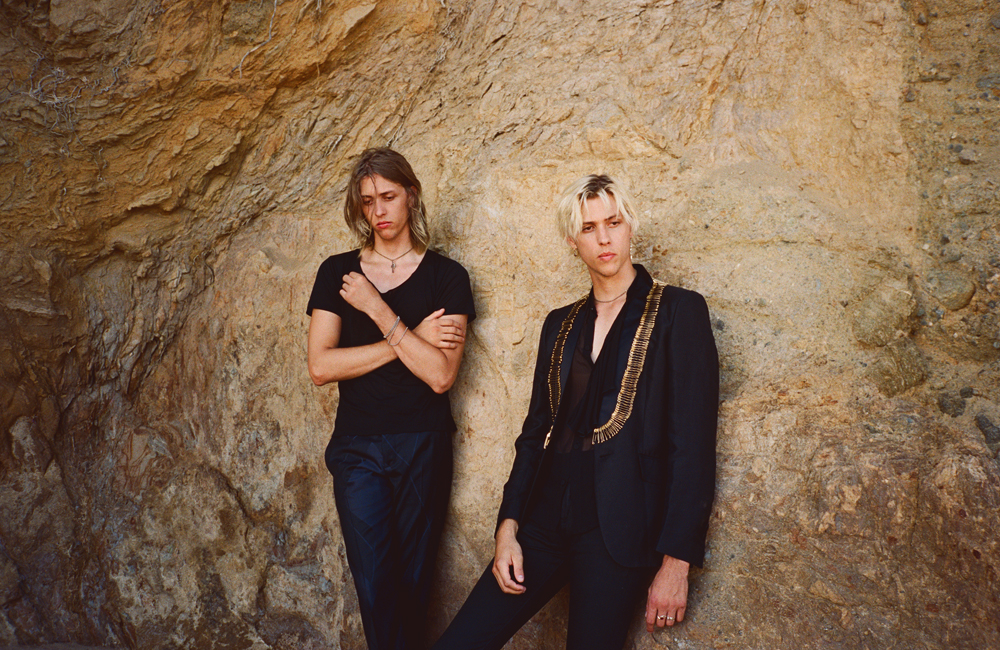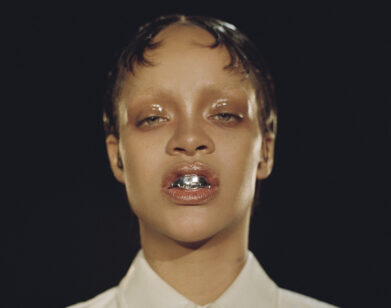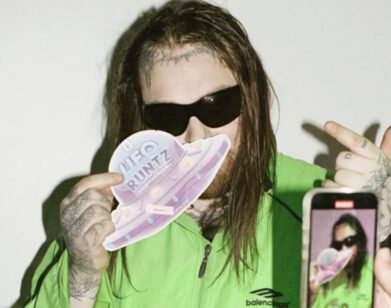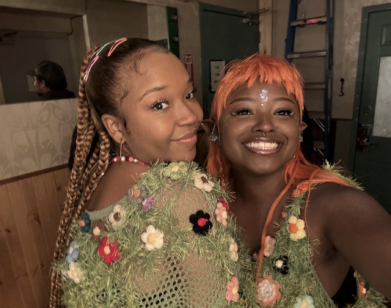The Garden Grows
THE GARDEN (FLETCHER AND WYATT SHEARS) IN LAGUNA BEACH, CA., SEPTEMBER 2015. PHOTOS: GUY LOWNDES. STYLING: DANI + EMMA. GROOMING: STEPHANIE HOBGOOD FOR EXCLUSIVE ARTISTS MANAGEMENT USING BUMBLE & BUMBLE.
Los Angeles-based duo The Garden released their debut album The Life and Times of a Paperclip in 2013. It was 16 tracks, hardly 18 minutes long, and composed only of bass, drums, and vocals, with lyrics that oftentimes were no more than one or two words. “We didn’t really know anything about doing a record, so we were just like, ‘Whatever,'” Wyatt Shears, one half of The Garden, recalls. This Friday, however, Wyatt and his identical twin brother Fletcher will release The Garden’s sophomore LP, Haha, a more evolved collection of songs with added instrumentation and expanded lyricism. “Knowing the ramifications and outcomes, and being more proud and aware of our work than we were the first time, we’re a lot more excited,” Wyatt says of the album’s release, before Fletcher jumps in: “It’s definitely a sign of our progression.”
Before Hedi Slimane invited the brothers to walk Saint Laurent’s Fall/Winter 2013 men’s runway show, the brothers had never left the U.S. Since that first trip to Paris, the Orange County-natives have returned season upon season, and toured everywhere from Europe to Australia to Asia. Moonlight modeling hasn’t reached their egos, though, as the two remain focused on what they call “Vada Vada:” a genre of music, but more importantly, a general creative expression to encompass everything they do.
The most recent example of Vada Vada is the video for “Egg,” which we are pleased to premiere below. In the video (directed by Liza Mandelup), Fletcher and Wyatt wear white denim, white turtlenecks, and white surgical masks while navigating their way over a green river and riding motorcycles through an overgrown prairie, eventually arriving at a house with white doors, where they encounter a woman also wearing white. Instead of just noisy bass and drums as heard on their debut, “Egg” features a full three minutes of smoothed production, keys (which Fletcher plays for this song, but Wyatt throughout the rest of Haha), and, most distinctively, lyrics.
Prior to Haha‘s release, we spoke with the musicians over the phone.
EMILY MCDERMOTT: How’s the tour going? I looked at the schedule and you have shows almost every single day all over the world.
WYATT SHEARS: As a whole, this is just the beginning, but we’ve been out here in Australia for about a week and a half now.
FLETCHER SHEARS: [yawns] We’re in the middle of a couple days off right now, as you can tell by that yawn.
WYATT SHEARS: No we’re not. We have a show tonight.
FLETCHER SHEARS: So true—what am I thinking? [laughs]
MCDERMOTT: Well congratulations on the upcoming record. There’s so much more instrumentation and lyricism. How do you think you’ve grown, both musically and personally?
WYATT SHEARS: We’ve been through a lot since that first record. As people, we’ve grown a lot. Musically, obviously we play constantly, and tour a lot, so we’ve grown in that way as well. I think it shows on this album—the culmination of growing, understanding the business that we’re diving into right now…
FLETCHER SHEARS: It shows little hints of personal maturity, but also a pretty solid progression music-wise as well. Growing as people, being on the road 24/7 for three years—I don’t think people realize how often we’re actually away from home, on the road, playing shows almost every night. Then being home, reflecting, and learning about yourself…
WYATT SHEARS: You learn a lot, you see a lot. That affects the music for sure.
MCDERMOTT: In the video for “Egg,” what’s the concept behind the surgical masks you’re wearing?
WYATT SHEARS: The surgical masks represent our connection with our grandmother—that’s what I was thinking. The person in that video is played to be our grandmother that passed away. She was supposed to be wearing a mask…
FLETCHER SHEARS: When my grandmother passed away [in 2010], we weren’t there. My whole family went to go watch her pass away, and for some reason, Wyatt and I didn’t want to go. But then we both met my grandmother in dreams and said goodbye, which was really weird. We said goodbye to her in separate dreams, and hugged and cried, so I think the masks, in a way, when they get taken off of us, are a symbol of letting go.
MCDERMOTT: That’s quite powerful. This might be cliché, but you both had similar dreams so I want to ask: do you find that you have twin telepathic moments?
FLETCHER SHEARS: There’s moments, yeah.
WYATT SHEARS: It’s not necessarily that we have twin telepathy moments, but its more like we’ll be driving in the car with one person we don’t know, something really funny will happen, and we’ll know that we saw it together, but we don’t say anything about it. I’ll make a certain beat on my leg and he knows what I’m talking about.
FLETCHER SHEARS: It’s like if we find something funny, we’ll push the other one really hard, and he’ll know why you did it.
WYATT SHEARS: It’s like hidden code between the two of us and some of our really close friends. It’s a weird way of speaking without speaking.
MCDERMOTT: The side solo music projects on your website, Enjoy and Puzzle, do you actually pursue those? Or have they kind of fallen by the wayside?
WYATT AND FLETCHER SHEARS: [both laugh]
MCDERMOTT: Maybe they are total jokes?
FLETCHER SHEARS: No, we actually take it pretty seriously. To us, they’re a part ourselves that we don’t put into The Garden. We put a certain part of ourselves into The Garden, a certain part our creativity. With Puzzle and Enjoy, it’s a different part of us. I’ve released like 21 albums with Puzzle, and he’s released like 24 with Enjoy. So we do have time, we get around to doing it. Whenever I’m home it’s my favorite thing to do. I wake up and do it; go to sleep and do it. I don’t make myself do it. It’s just something I love. It feels good. If I didn’t have it [now], I would end up having it at some point because it feels right.
WYATT SHEARS: Likewise to all of that.
MCDERMOTT: What are the parts of yourselves that you express through the side projects and not through The Garden?
FLETCHER SHEARS: Maybe more of a romantic side of ourselves, as far as relationships and personal feelings. Every once in a while, something about personal growth and feeling will go into a Garden song, but if you listen to Enjoy lyrics or Puzzle lyrics, it refers to personal experience rather than the world that Wyatt and I share together. It’s more about experiences on our own. In Puzzle, I don’t really sing about me and Wyatt and stuff we do together. I sing about stuff I do on my own, and Wyatt sings about his personal life that doesn’t involve me.
MCDERMOTT: You previously citied Mykki Blanco as a style influence. Do you still feel that way?
FLETCHER SHEARS: I don’t know if I look to anybody in particular or if I’ve ever looked to anybody for style, but I definitely followed Mykki Blanco’s career very closely and really liked a lot the things he was doing and stood for. I still pay attention to his career, but not as closely. Of course I loved what he wore; it was interesting. From when he first started I was really into it, and I still am. I always keep tabs on what he’s doing—not in a creepy way. [laughs]
MCDERMOTT: Who are some people who you do follow closely, be it in music, film, art, or anything?
FLETCHER SHEARS: I’ll be perfectly honest—
WYATT SHEARS: Ricky Martin. [laughs]
FLETCHER SHEARS: To be perfectly honest, that was it for me. Mykki Blanco was an important figure in my time for me. It’s not like I was 10 years old when I found out about him, because he wasn’t doing anything then, but for me, I was very inspired from what he was doing. I can’t really think of anybody else.
WYATT SHEARS: There’s people here and there. It comes and goes. Somebody that I may have taken a lot of time to observe at one point, I don’t anymore.
FLETCHER SHEARS: Not because you don’t like them—
WYATT SHEARS: —but you move on. As you change, so do your influences.
MCDERMOTT: What about your writing process? With the debut you said you would just go into the studio and see what happened. Is it still that way?
WYATT SHEARS: What’s been happening lately is that if we’re not practicing directly in the garage with one another, I’ll start on my computer, make everything—the parts Fletcher usually does are loops, so I’ll make the melodies and the lyrics. Then I’ll take it to Fletcher and say, “Hey, what do you think of this?” We’ll brainstorm over it and then he’ll add in his parts, what he needs, and then it will become both of our song. Unless it’s just a straight electronic song where we’re both just singing, it usually starts from the desk or the garage.
FLETCHER SHEARS: Yeah, you don’t limit yourself to one practice space and one creative space. You can do it anywhere and see what comes out. No matter what you come out with, whatever genre it may classify as, it’s still what you’re doing. We could make a jungle song and it’d still be The Garden because we put our own Garden flair on it.
WYATT SHEARS: We could make a book and it could be The Garden. For us, it’s whatever we want it to be.
MCDERMOTT: And do you still live together?
WYATT AND FLETCHER SHEARS: Yes.
FLETCHER SHEARS: [With] Mommy and daddy. [both laugh] We still share our same room, too. Basically, we are trying to figure out when and how to move when we’re touring this much—how not to just pay for a ghost room.
WYATT SHEARS: We’ve been looking at houses and meeting with people, but it’s really fucking hard because we’re never home. It always makes us feel silly when people are like, “Where do you live?” and it’s like, “Uhh, in the same room.” It’s hard to get out when we’re not home.
FLETCHER SHEARS: We could have out own sitcom. Our room is like that show Hoarders.
MCDERMOTT: What are some of the things that you hoard?
WYATT SHEARS: You know when it’s Halloween or Christmas and there are those light-up molds of ghost or Santa Claus? Tons of those. I’ve got a bunch. I collect those.
FLETCHER SHEARS: I hoard Yu Yu Hakusho merchandise for sure. It’s my favorite TV show. I’m a superfan. I hoard that majorly—if I lined it all up together and put it in a pile it would look pretty intense.
MCDERMOTT: How much do you think its worth?
FLETCHER SHEARS: I was in Japan recently and scored something pretty dang cool for only 20 dollars U.S. I have a feeling it’s worth a lot more money.
WYATT SHEARS: Probably a good five hundo’!
FLETCHER SHEARS: [laughs] I feel like I got a really good score just because I was in Japan and they don’t care about it as much as someone in the U.S. maybe would. Maybe I could get money off of it, but I like the show too much to sell any of this stuff, and I have a feeling that I’ll like it forever.
WYATT SHEARS: We’re big eBay shoppers.
MCDERMOTT: So you first coined “Vada Vada” in 2011. Do you still consider that your genre?
WYATT SHEARS: Most definitely. It connotes everything we do, everything we will do.
FLETCHER SHEARS: We live VV. It sums up exactly what we’re doing—
WYATT SHEARS: —and how we want to go about it. No one else gets a say.
MCDERMOTT: How did you come up with that as the name?
WYATT SHEARS: It was just kind of like [speaks quickly in jibberish]—me saying words in the garage while I was not actually thinking of anything. Vada Vada was one of the jibberish words that came out of my mouth. I remember that I liked what it sounded like. At the time, our Garden songs were so damn simplistic that I was like, “Okay, those are the lyrics,” and then Vada Vada became what it was. We had a couple friends that we really liked to brainstorm with about creative ideas, so we kind of came up with a philosophy of our own world, but in reality—a bubble that it could represent. It just snowballed from there.
I remember sitting down, me and my friend, and we came up with what Vada Vada was, what it represented, what it could be. I remember coming to school the next day, telling my best friends and Fletcher—he showed up in the middle of the middle of the main chat—and I was just being a little bastard. I was telling everybody, “I got this cool thing to tell you guys: it’s Vada Vada. It represents this, and it’s going to be totally what we can go by.”
FLETCHER SHEARS: I was so stoked on it. I told somebody that I was seeing at the time and they were like, “What the fuck?” I was like, “You don’t get it!”
WYATT SHEARS: We met up that day, explained it, and that formed the VV crew.
MCDERMOTT: So what is the philosophy of Vada Vada?
FLETCHER SHEARS: When somebody asks what Vada Vada means right now, to us, it means pure creative expression, equality, and doing what you’re doing without boxing yourself in and pigeonholing yourself—freely, creatively expressing yourself.
WYATT SHEARS: You’re placing yourself in reality, but you’re not worried about what’s going on around you. Another example of Vada Vada is that one time we made this character—it had a little devil face, a hat, and then me and my friend stood in a blanket, so kind of like a horse body with a devil face. We would drop “it” off—a.k.a. Fletcher would drop me and my friend off—and we would walk around town, through malls, but we wouldn’t talk to anybody or do anything. People would ask us what’s going on and it would be Vada Vada. That’s placing your own creativity in the public eye. They can choose to judge it, label it, do whatever they want with it. One guy was even like, “El Diablo, El Diablo!” But that’s what Vada Vada is: doing your own pure creative thing and putting it out in public. It doesn’t matter what anyone thinks because you’re going to keep progressing forward.
FLETCHER SHEARS: You don’t have to call it Vada Vada, you don’t have to call it anything; it can just be a creation that came from you. It doesn’t have to be punk, it doesn’t have to rap, it doesn’t have to be anything. It just is what it is, because it came from you and it’s a part of you. It could go with gender, it could go with anything. I consider that for myself.
MCDERMOTT: I imagine growing up in Orange County is a rather stifling environment. How did you learn to embrace yourself so fully and manage to truly not care what other people think?
WYATT SHEARS: In Orange County, it’s really easy to stick out and it’s really easy to blend in, so you go [one] way [or the other].
FLETCHER SHEARS: I feel like no matter what, even if I’m wearing a very normal jacket with normal pants and normal shoes and normal hair and normal everything, I’m still going to get honked at by a car for some reason. So at the end of the day, it doesn’t really matter what I do. I just like to live doing what makes me feel really good. If that makes me feel good, then I’m happy, and nothing else should matter.
MCDERMOTT: Doing something like walking a runway show is more commercial than everything else you do or seem to believe in. How did you decide to do that?
FLETCHER SHEARS: We’re not about not being commercial. I think if anybody got the opportunity to do that, that would be like, “Great, do it!” We’re also about taking opportunities and exploring new areas. If we were to say, “Oh that’s commercial, we don’t want to do that,” how the fuck would we know?
WYATT SHEARS: Then you’re just limiting yourself.
FLETCHER SHEARS: You’re not being open-minded. You’re judging something before you know anything about it. So for us it’s like, “Okay, we’ll try it.” People limit themselves too much because of things they’ve heard or think they know. Like a celebrity, like, “Oh, fuck Miley Cyrus, man”—you don’t know her. You have no fucking idea why she’s doing anything she’s doing. You don’t know anything about any celebrities. You just know what the media tells you.
WYATT SHEARS: And you’re really going to trust the media? The media’s famous for lying. [laughs]
FLETCHER SHEARS: Why don’t you just forget about it? Who cares? It’s not real life, you know? So it’s like, take opportunities, be open in every aspect of life, be happy with yourself.
MCDERMOTT: What’s one of the biggest things you’ve learned from becoming part of the Saint Laurent family?
WYATT SHEARS: To remember to be yourself and don’t fall into the stereotypical model life. Keep your wits about you.
FLETCHER SHEARS: Yeah, keep your wits about you, be respectful, remember that you’re not the king just because you got asked to do a runway. A lot of people show up and they’re like, “Fuck yeah, I got asked, I’m definitely the most important here, let’s paaaarty!” It’s like, “No. This has been happening for years.”
WYATT SHEARS: You’ve got to remember where you’re at: you’re in the house of YSL, a very old prestigious brand, and they can kick you out and send you right back home.
FLETCHER SHEARS: And not to be fucking insincere. You don’t own everything. Wyatt and I have learned to keep calm, observe surroundings, and be respectful.
WYATT SHEARS: But on top of everything, have fun.
MCDERMOTT: I feel like we’ve talked about everything that I wanted to mention. Is there anything that you wanted to talk about that I didn’t mention?
FLETCHER SHEARS: Well, we’re in a hotel right now with a ghost.
WYATT SHEARS: There’s a couple ghosts in here, for real.
FLETCHER SHEARS: It’s the venue we’re playing, but there are a few rooms where bands stay and apparently a little girl fell off the roof of this building and died.
WYATT SHEARS: And then a guy in the basement got his head decapitated. We were down there and it smells like—
FLETCHER SHEARS: It smells like shit down there. So we’re freaked out. The room that the little girl died in is right down—I feel uncomfortable saying this because we’re so close to it. So right now, we’re a little bit on edge, but we’ve been hanging out, listening to rap music with the window open.
WYATT SHEARS: Some Rich Gang, some A$AP Ferg.
MCDERMOTT: Wait, so you’re interested in ghosts and things like that?
WYATT SHEARS: Yes, but not to tamper with them because we know the repercussions of that. Unless you know what you’re doing, it’s really dumb to screw with that kind of thing.
FLETCHER SHEARS: Basically, don’t go Zak Bagan.
WYATT SHEARS: Don’t go Zak Bagan, who’s the host of Ghost Adventures. We’re into it from a distance basically. We don’t go exploring.
FLETCHER SHEARS: I keep thinking I’m going to turn around and she’s going to be in the hallway staring at me. I’m not going to be able to sleep in that room tonight.
MCDERMOTT: You never know what that little girl may do if you sleep in her room.
FLETCHER SHEARS: She might even try to throw us off the balcony… I shouldn’t be saying that…
WYATT SHEARS: Please Fletcher, don’t make this a typical movie situation. Don’t be the guy who gets eaten first.
HAHA WILL BE RELEASED ON FRIDAY, OCTOBER 9. FOR MORE INFORMATION ON THE GARDEN, VISIT THE BAND’S WEBSITE.







